Lukwago doesn’t mind taking a walk on a cold day, as long as she can bundle up. Although she’s hardly visible underneath her coat and hat, she says she’ll be noticed by friends and acquaintances when she goes out.
‘Walking dynamite’ lights up community
December 4, 2019
O
n a chilly November morning, a tiny woman, bundled up tight in a blue and black winter coat and shielded from the sun by a blue bucket hat, follows the sidewalk alongside 15th Street just like she’s done hundreds of times before with a smile on her face and an undeniable pep in her step. If you don’t recognize this high spirited pedestrian at first glance, you’re one of the few.
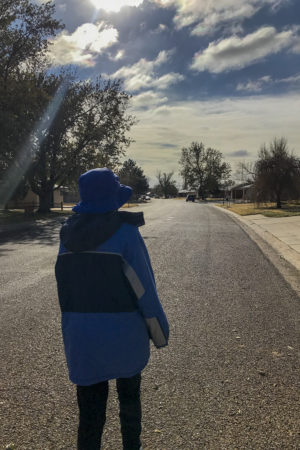
Lukwago walks around her neighborhood on a chilly November morning. Later, she’ll go on another walk when she has somewhere to be.
Susan Lukwago can’t seem to make it more than a few blocks without a passing car sounding its horn, or an occupant waving excitedly at her as they drive by. Only some of these friends know Lukwago personally; most everyone recognizes her as the lady that seems to, for some reason, walk everywhere.
If you’ve seen her walking before, and chances are, if you live in Liberal, you have, you might stop to offer her a ride. It is a bit cold, after all. She’d smile at you–one of her, wide, genuine, white-toothed grins–and politely decline in a soft Ugandan accent. Lukwago has somewhere to be, but her chosen method of transportation is only partly inspired by her need to reach her destination. There’s another reason she’s walking.
When she reaches her destination, whether it be the store, her home, or the health department where she works as a dietician, she feels warm before she ever steps out of the cold. Everyone knows the little black lady that walks the town, doling out smiles and waves, but only some know about what Lukwago does to show that she loves the community she’s become a part of just as much as her community seems to love her.
Growing up, far away from Kansas
It’s hard to imagine that Lukwago hasn’t always lived in Liberal, considering how familiar the community is with her. The world that Lukwago grew up in is a far cry from the small, rural town in Kansas where she ended up. Born in 1966 and raised in the capital city of Kampala, Uganda, Lukwago enjoyed a strict, but happy childhood in Africa as the eldest of four girls.
“My family had a very nice life in Uganda, and my sisters and I went to good schools where we learned English, and a little French, too. My mother was a physician, and my father an economist,” Lukwago said. “We had a nanny who took care of us, bathed us and did our hair. We ate traditional foods like rice and beans. Life was very good. We were blessed.”
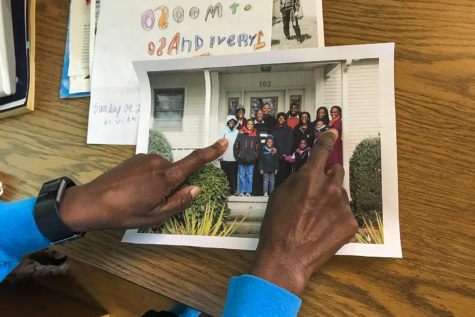
Lukwago points out herself and one of her sisters in a photo that was taken of her family the last time they all met up. “Obviously, it was cold that day,” she said.
When she was 11 years old, Lukwago and her family were forced to relocate to Nairobi, Kenya as refugees during a time of civil unrest in Uganda following former President Idi Amin’s persecution and oppression of specific tribes and ethnic groups. It’s because of this, she says, that she’s able to easily sympathize with other refugees fleeing unstable and corrupt governments around the world.
“Moving to Kenya was not something that my family did out of choice, and it wasn’t a very pleasant experience for me. In Uganda, before we left, there was shooting in the streets at night, and people belonging to the wrong tribes would simply disappear. Leaving our home did not feel good for us then, but if we hadn’t, I probably wouldn’t be here where I am now,” Lukwago said.
When it came time for college, Lukwago’s mother strongly encouraged, and in some ways, required, Lukwago to pursue further education in the U.S., and in 1985, she began attending St. Catherine University in St. Paul, Minnesota as an undergraduate majoring in nutrition. In order to extend her stay in America, Lukwago earned her master’s in medical dietetics, and later, her doctorate in public health research at St. Louis University in St. Louis.
Although Lukwago had never been to the U.S. before college, she was immediately smitten with the friendly people and diverse crowds she experienced in St. Paul and St. Louis. When she finally gained her citizenship and moved to Liberal for work, she experienced yet another culture shock.
“When I moved to Liberal, I was thinking, holy cow, this is tiny! I had never lived somewhere so small before,” Lukwago said. “Where’s the bus? Are there highways? Malls? Restaurants?”
Despite being entirely unfamiliar with small town living, it didn’t take long for Lukwago to make friends, and to become an important part of her new community.
Finding and building a community in Liberal
The first thing Lukwago did when she arrived in Liberal, alone, and unfamiliar with the ins and outs of such a small community, was seek out places she could volunteer her time and seemingly endless energy to what she’s most passionate about: diet, exercise and community outreach.
Lukwago quickly became involved with United Way, where she’s currently still a board member, and Stepping Stone shelter, where she served for nine years.
For her, the question of whether or not to become involved in her new community was never really a question, but a certainty. She knew that, even though she was new in town, she wanted to do whatever she could for the people that would soon become her friends, and in many ways, family. It’s just how she was raised.
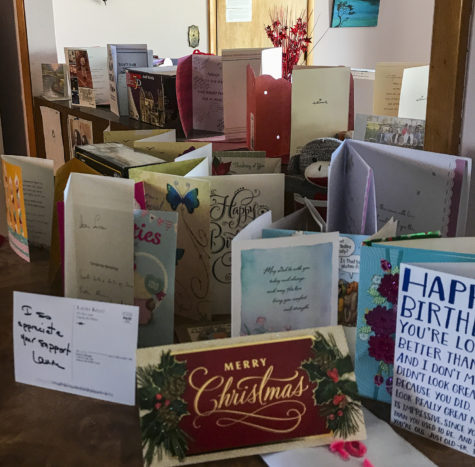
Lukwago keeps cards from friends and family on display in her kitchen. “It looks a little cluttered, but I keep them out all the time because they make me happy,” Lukwago said.
McKensie Hood, the director of United Way in Liberal, felt just as welcomed and encouraged by Lukwago’s warm and well established presence on the board when Hood assumed her position as Lukwago did when she first joined the United Way team.
“When I met Susan, I was so inspired by how energetic and passionate she is about causes in the community. It made me want to do my job in the same way,” Hood said. “As we became friends, I realized, on top of the other stuff, how truly good and tender-hearted she is. I wish everyone could work with her.”
Hood described Lukwago’s presence, at “every event United Way hosts in Seward County,” by the way, as a “light in a dark room.” At these events, members and volunteers raise funds for non-profit causes in and around Liberal–work that Lukwago finds meaningful and rewarding.
“Sometimes, people find it hard to volunteer, and it can be a lot to take on, but even the small things make a difference. Just picking up trash makes a huge difference, for example, and when our community looks nice, we all feel better! Doing that makes me happy. I am always asking myself, ‘is there something in this situation that I can do to help?’” Lukwago said.
Lukwago also serves on the board for the Liberal Area Coalition for Families, where she and others promote healthy eating and exercise through grants and community initiatives that promote public health.
It may surprise people to learn that these activities aren’t even a part of Lukwago’s actual job; when she’s not volunteering for local nonprofits, Lukwago devotes time to her job as a WIC dietician at the local health department, and frequently travels to 12 other, nearby health departments to do similar work in neighboring communities.
Discussing her work makes Lukwago almost giddy. When she speaks of one of the things she loves most–promoting healthy lifestyles to others–she can hardly contain her enthusiasm, and she certainly can’t suppress her signature grin. It’s no wonder, then, that Lukwago, as busy as she is, never seems to burn out.
“At the health department, I get to work with many kids and adults on WIC that really need assistance,” Lukwago explains with a smile on her face, and in her
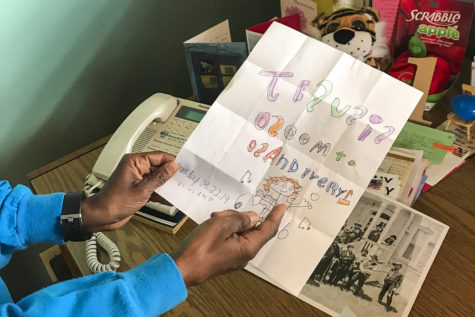
This drawing, given to Lukwago by a child in her church congregation, is one of her favorites. “I have no idea what it says, but I love it,” Lukwago said.
voice. “People with low iron, diabetes, who are underweight or overweight. I help them with whatever they need.”
Lukwago explained that because eating is such a personal, sensitive and essential activity, she never approaches clients with judgement or rigidity. Tiffani Krause, Lukwago’s WIC boss, affirmed Lukwago’s claim.
Krause met Lukwago in 2005, as both were members of the original staff that opened the WIC office that June. Since then, Krause has witnessed Lukwago go from an enthusiastic, but new and largely unknown figure in Liberal, to a major and essential part of the community.
“Susan does so much for Liberal–more than people even realize,” Hood said. “She comes in to work every day, so lively and happy to be there, and she practices what she preaches. She’s so good with the clients, and they love her. She never judges.”
Those that aren’t familiar with the many nonprofit organizations that Lukwago works with might be a little bit more acquainted with another project of Lukwago’s: the now closed Spencer Brown’s coffee house which Lukwago co-owned and ran with friends.
“Spencer Brown’s was a very hopeful business; our motto was ‘big city taste, hometown feel.’ We got to employ so many young people with a living wage and get them started. It was a wonderful experience,” Lukwago said.
Hood’s description of Lukwago as “everybody’s sunshine” is something that nearly everyone who’s met Lukwago would seem to agree with. Her friends describe the way she lights up her community, not only through her tireless volunteer work, but also through her mere presence on the streets as she walks from place to place, sharing warm smiles with people most would strictly regard as strangers.
So, why walk?
Some onlookers might guess that Lukwago walks because she doesn’t have a car, but this isn’t the case. She has a car, but she typically only uses it when she leaves town. Why walk, then?
Catherine Corn, a friend and fellow church member at First United Methodist Church where Lukwago attends regularly says that, like most people, she’s happy when she sees Lukwago walking around town even if it’s something Corn wouldn’t do herself.
“When I see her [Lukwago] I stop if I can, give her a hug, and visit. If I can’t stop, I still wave,” Corn said. “It’s been that way since she first came to the church six or seven years ago; she’s always been someone I wanted to know, so vivacious, loving, caring and highly intelligent. I see her walking and I think, there goes 100 pounds of walking dynamite.”
Besides walking in her free time, or, rather, in between the many activities she participates in, Lukwago likes to dance at Zumba sessions, attend church, or, when she’s at home, read, play the piano and work on puzzles. She flies from puzzle to piano and room to room of her home, always in pursuit of the activities that make her happiest—even on her off days, she likes to be doing something.
On one of her few days off, Lukwago sits on her carpet in her living room in front of a puzzle depicting Kansas City’s skyline. Her smile disappears only when she has a tough piece to contend with, as her expression becomes thoughtful and she holds the piece up to the picture on the front of the box and peers at it through her wire framed glasses. If she can see the colors from the piece in the picture, she can find the piece’s location in the puzzle more easily.
Later, she’ll slip on her blue coat and bucket hat and walk to wherever she has to be. After all, if something is 30 minutes or less away, Lukwago walks–again, not because she doesn’t have a car. She sounds happiest when she explains why she does so when most would prefer to drive.
“I walk for exercise. That’s the first reason,” Lukwago said. “I don’t have a lot of time for it otherwise. But, I also walk so that I can pick up trash along the way, and because, where I’m from, walking is just what you do.”
“Maybe the best part about walking, though, is that, when I walk, I know my community appreciates me. I don’t have kids. I’m not married. My community is my family. I feel known and loved–truly–when people see me walking and wave, or honk, or offer me a ride.”
So, next time you see the small, but bright light that illuminates the community bundled up and walking to work, or to church or, perhaps, to Zumba, don’t be shy. Just don’t expect her to accept if you offer her a ride.


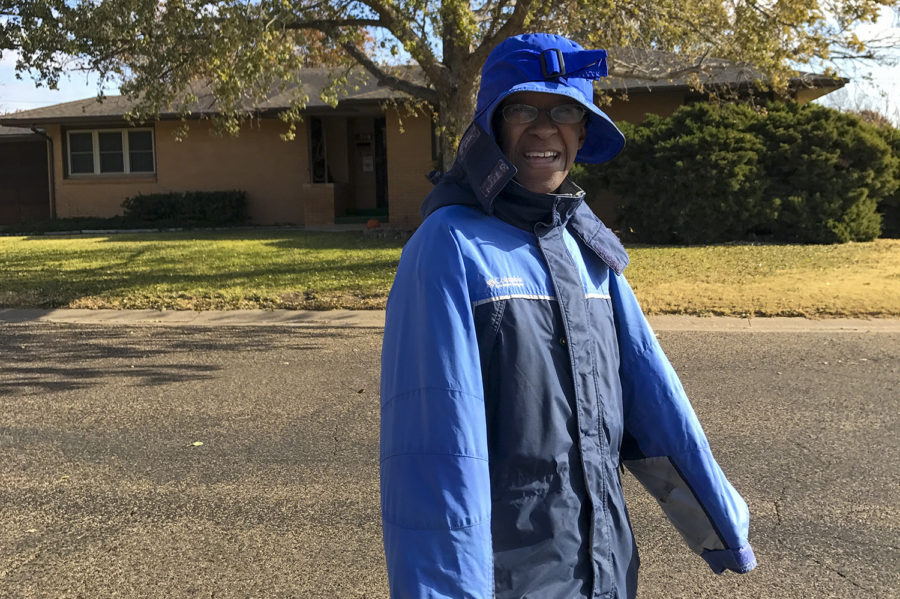
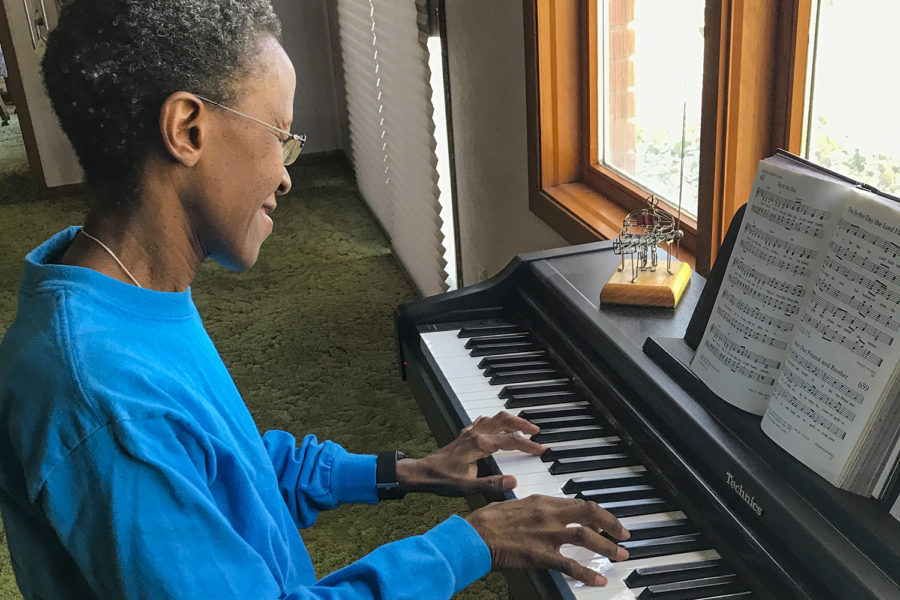
Royce L. Kitts • Dec 18, 2019 at 4:46 pm
Susan is a ray of sunshine wherever she goes. Liberal is lucky to have such an awesome person in our midst.
Melisa Westerman • Dec 5, 2019 at 8:58 pm
Thanks, Cheyenne, for a well written, positive article. Proud of you. A fine tribute to a great lady who is the epitome of encouraging influence.
Jerri Lynn Lyddon • Dec 5, 2019 at 7:50 am
Excellent article about a lovely lady this community is fortunate to have living among us! Three cheers to you both!
Anonymous • Dec 4, 2019 at 4:23 pm
Susan is a respectable and very very polite person all of these things said about her in this article is very true but I don’t like the fact she keeps getting called the little black woman. It shouldn’t even be a factor in it all.
Annette Meza • Dec 5, 2019 at 9:27 am
Normally we don’t allow anonymous comments, but since this one was so good, we allowed it.